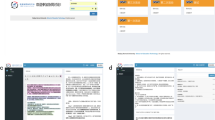Abstract
We explored the scientific argumentation that occurs among university biology students during an argumentation task implemented in two environments: face-to-face in a classroom and online in an asynchronous discussion. We observed 10 student groups, each composed of three students. Our analysis focused on how students respond to their peers’ unscientific arguments, which we define as assertions, hypotheses, propositions, or explanations that are inaccurate or incomplete from a scientific perspective. Unscientific arguments provide opportunities for productive dissent, scientific argumentation, and conceptual development of scientifically desirable conceptions. We found that students did not respond to the majority of unscientific arguments in both environments. Challenges to unscientific arguments were expressed as a question or through explanation, although the latter was more common online than face-to-face. Students demonstrated significantly more epistemic distancing in the face-to-face environment than the online environment. We discuss the differences in discourse observed in both environments and teaching implications. We also provide direction for future research seeking to address the challenges of engaging students in productive scientific argumentation in both face-to-face and online environments.
Similar content being viewed by others
References
Allen, D., & Tanner, K. (2005). Infusing active learning into the large-enrollment biology class: seven strategies, from the simple to complex. Cell Biology Education, 4(4), 262–268.
Asterhan, C. S. C. (2013). Epistemic and interpersonal dimensions of peer argumentation: Monceptualization and quantitative assesment. In M. Baker, J. Andriessen, & S. Järvelä (Eds.), Affective learning together: social and emotional dimensions of collaborative learning (pp. 251–271). New York: Routledge.
Asterhan, C. S. C., & Eisenmann, T. (2011). Introducting synchronous e-discussions in co-located classrooms: a study on the experiences of 'active' and 'silent' secondary school students. Computers in Human Behavior, 27(6), 2169–2177.
Asterhan, C. S. C., & Schwarz, B. B. (2007). The effects of monological and dialogical argumentation on concept learning in evolutionary theory. Journal of Educational Psychology, 99(3), 626–639.
Asterhan, C. S. C., & Schwarz, B. B. (2009). Argumentation and explanation in conceptual change: indications from protocol analysis of peer-to-peer dialog. Cognitive Science, 33, 374–400.
Asterhan, C. S. C., & Schwarz, B. B. (2016). Argumentation for learning: well-trodden paths and unexplored territories. Educational Psychologist, 51(2), 164–187.
Asterhan, C. S. C., Schwarz, B. B., & Gil, J. (2012). Small-group, computer-mediated argumentation in middle school classrooms: the effects of gender and different types of online teacher guidance. British Journal of Educational Psychology, 82(3), 375–397.
Berland, L. K., & Reiser, B. J. (2009). Making sense of argumentation and explanation. Science Education, 93(1), 26–55.
Berland, L. K., & Reiser, B. J. (2011). Classroom communities’ adaptations of the practice of scientific argumentation. Science Education, 95(2), 191–216.
Berland, L. K., & Hammer, D. (2012). Framing for scientific argumentation. Journal of Research in Science Teaching, 49(1), 68–94.
Butera, F., Darnon, C., & Mugny, G. (2010). Learning from conflict. In J. Jetten & M. Hornsey (Eds.), Rebels in groups: dissent, deviance, difference and defiance (pp. 36–52). Oxford: Oxford University Press.
Chiu, M. M. (2008). Effects of argumentation on group micro-activity: statistical discourse analysis of algebra students’ collaborative problem-solving. Contemporary Educational Psychology, 33, 382–402.
Conlin, L. D., & Scherr, R. E. (2017). Making space to sensemake: epistemic distancing in small group physics discussions. https://doi.org/10.13140/RG.2.1.4811.7600.
Corbin, J., & Strauss, A. (2008). Basics of qualitative research: techniques and procedures for developing grounded theory. Thousand Oaks: Sage Publications.
Darnon, C., Doll, S., & Butera, F. (2007). Dealing with a disagreeing partner: relational and epistemic conflict elaboration. European Journal of Psychology of Education, 22(3), 227–242.
Duschl, R. A., Schweingruber, H. A., & Shouse, A. W. (2007). Taking science to school: learning and teaching science in grades K-8. Washington: National Academics Press.
Eagly, A. H., & Johnson, B. T. (1990). Gender and leadership style: a meta-analysis. Psychological bulletin, 108(2), 233–256.
Erduran, S., Simon, S., & Osborne, J. (2004). TAPping into argumentation: Developments in the application of Toulmin’s argument pattern for studying science discourse. Science Education, 88(6), 915–933.
Guadagno, R. E., & Cialdini, R. B. (2002). Online persuasion: an examination of gender differences in computer-mediated interpersonal influence. Group Dynamics: Theory, Research, and Practice, 6(1), 38–51.
Guiller, J., & Durndell, A. (2006). ‘I totally agree with you’: gender interactions in educational online discussion groups. Journal of Computer Assisted Learning, 22(5), 368–381.
Guiller, J., Durndell, A., & Ross, A. (2008). Peer interaction and critical thinking: face-to-face or online discusion? Learning and Instruction, 18(2), 187–200.
Handelsman, J., Ebert-May, D., Beichner, R., Bruns, P., Chang, A., Dehaan, R., Gentile, J., Lauffer, S., Stewart, J., Tilghman, S. M., & Wood, W. B. (2004). Scientific teaching. Science, 304(5670), 521–522.
Hew, K. F., & Cheung, W. S. (2011). Higher-level knowledge construction in asynchronous online discussions: an analysis of group size, duration of online discussion, and student facilitation techniques. Instructional Science, 33(3), 303–319.
Holt, J. L., & DeVore, C. J. (2005). Culture, gender, organizational role, and styles of conflict resolution: a meta-analysis. International Journal of Intercultural Relations, 29(2), 165–196.
Jimenez-Aleixandre, M. P., & Erudran, S. (2008). Argumentation in science education: an overview. New York: Springer.
Kärkkäinen, E. (2007). Epistemic stance in English conversation: a description of its interactional functions, with a focus on I think. Amseterdam: John Benjamins.
Knight, J. K., & Wood, W. B. (2005). Teaching more by lecturing less. Cell Biology Education, 4(4), 298–310.
Kuhn, D., & Udell, W. (2007). Coordinating own and other perspectives in argument. Thinking and Reasoning, 74(2), 90–104.
Lee, S. W., & Tsai, C. (2011). Identifying patterns of collaborative knowledge exploration in online asynchronous discussions. Instructional Science, 39(3), 321–347.
McWilliam, E., Poronnik, P., & Taylor, P. G. (2008). Re-designing science pedagogy: reversing the flight from science. Journal of Science Education and Technology, 17(3), 226–235.
Mercer, N., & Littleton, K. (2007). Dialogue and the development of children's thinking: a sociocultural approach. New York: Routledge.
Michaels, S., O'Connor, C., & Resnick, L. B. (2008). Deliberative discourse idealized and realized: accountable talk in the classroom and in civic life. Studies in Philosophy & Education, 27, 283–297.
Moje, E. B., Ciechanowski, K. M., Kramer, K., Ellis, L., Carrillo, R., & Collazo, T. (2004). Working toward third space in content area literacy: an examination of everyday funds of knowledge and discourse. Reading Research Quarterly, 39(1), 38–70.
Nandi, D., Hamilton, M., & Harland, J. (2012). Evaluating the quality of interaction in asynchronous discussion forums in fully online courses. Distance Education, 33(1), 5–30.
NGSS Lead States. (2013). Next generation science standards: for states, by states. Washington: The National Academies Press.
Oh, S. & Jonassen, D. H. (2007). Scaffolding online argumentation during problem solving. Journal of Computer Assisted Learning, 23, 95–110.
Resnick, L. B., Michaels, S., & O'Connor, M. C. (2010). How (well-structured) talk builds the mind. In D. D. Preiss, & R. J. Sternberg (Eds.), Innovations in educational psychology: perspectives on learning, teaching, and human development (pp. 163–194). New York: Springer.
Schwarz, B. B., & Asterhan, C. S. (2011). E-moderation of synchronous discussions in educational settings: a nascent practice. Journal of the Learning Sciences, 20, 398–442.
Topcu, A., & Ubuz, B. (2008). Effects of the asynchronous web-based course: preservice teachers’ achievement, metacognition, and attitudes towards the course. Educational Technology & Society, 11(3), 181–197.
Toulmin, S. E. (1958). The uses of argument. New York: Cambridge University Press.
Tsai, P. S., & Tsai, C. C. (2013). College students’ experience of online argumentation: conceptions, approaches and the conditions of using question prompts. Internet and Higher Education, 17(1), 38–47.
Tsai, P. -S., & Tsai, C. -C. (2014). College students' skills of online argumentation: the role of scaffolding and their conceptions. The Internet and Higher Education, 21, 1–8.
Walker, J. P., & Sampson, V. (2013). Learning to argue and arguing to learn: argument-driven inquiry as a way to help undergraduate chemistry students learn now to construct arguments and engage in argumentation during a laboratory course. Journal of Research in Science Teaching, 50(5), 561–596.
Wilhelm, J. A., Smith, W. S., Walters, K. L., Sherrod, S. E., & Mulholland, J. (2008). Engaging pre-service teachers in multinational, multi-campus scientific and mathematical inquiry. International Journal of Science and Mathematics Education, 6(1), 131–162.
Author information
Authors and Affiliations
Corresponding author
Rights and permissions
About this article
Cite this article
Callis-Duehl, K., Idsardi, R., Humphrey, E.A. et al. Missed Opportunities for Science Learning: Unacknowledged Unscientific Arguments in Asynchronous Online and Face-to-Face Discussions. J Sci Educ Technol 27, 86–98 (2018). https://doi.org/10.1007/s10956-017-9710-4
Published:
Issue Date:
DOI: https://doi.org/10.1007/s10956-017-9710-4




